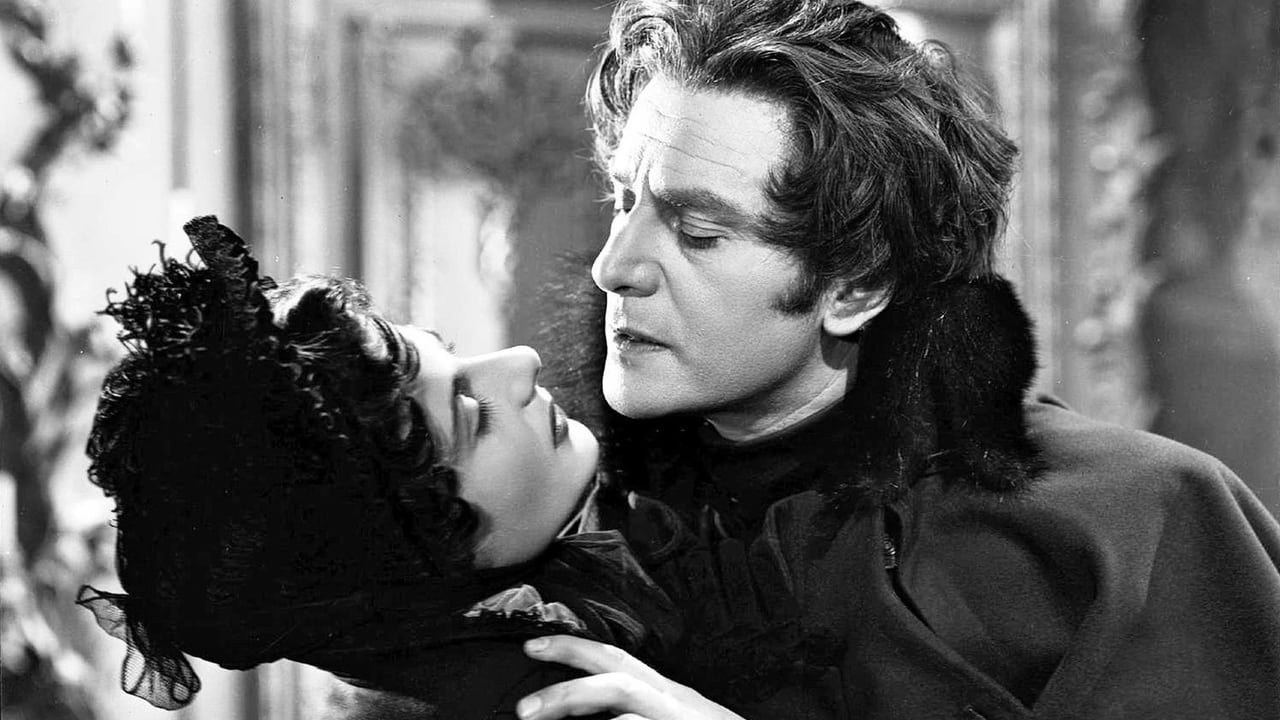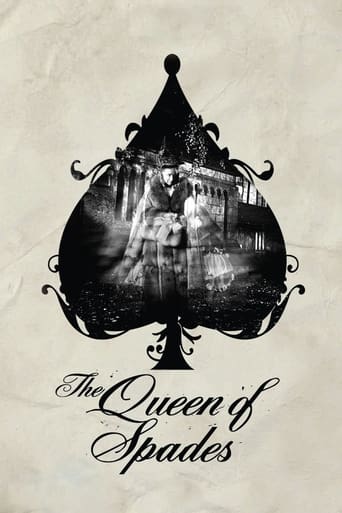

A middle ranking soldier in the Russian imperial army is stung in to taking on his superiors at a card game, convincing himself that the secret of success lies in the spooky past of an aristocratic dame. Can he win? And at what cost? Melodrama with a noir feel, which just about qualifies as horror. The photography is outstanding, with light/shadow/angles creating soulful atmosphere, and the director does some great combinations of music and close-ups on old actresses.At first the story is a bit slow and muddled, but it does wind up to an intense climax. The characters don't really matter or say anything true, and the most touching scene is with an extra mourning over a coffin. The actors are good although sometimes stagey - that's the dialogue for you. Also lots of nice touches with minor characters, and I got the feel there was a lot of satire sacrificed for the sake of an underwhelming romance.Music is orchestral, mostly effective, sometimes overblown - but the gypsy singers create an exotic mood + the coffin scene has a mournful hymn.Overall: lots of quality, but script/direction should have been sharper.
... View MoreIn the early 1800s, Russian soldiers entertain themselves by playing cards and whoring with gypsies. However, for one under-achieving military man Anton Walbrook (Suvorin), this is a waste of time. "What?!!" - I hear you cry - "How can that possibly be a waste of time?" - well, I didn't write it, so don't shoot the messenger. Walbrook has a much darker take on life and he's also got a problem with being a bit of a nobody. So he buys a book from a spooky bookkeeper Ivor Barnard. This book holds the key to bargaining with the devil to win a fortune by playing a card game and it names a certain old Countess Edith Evans (Ranevskaya) as having gone through this particular process. Walbrook is desperate to meet Evans and get the secret to everlasting wealth from her, ie, the secret of the cards.The character names can be confusing in this film, particularly at the beginning, but this doesn't really affect the proceedings as it is fairly easy to understand the relationships between the characters and that's what matters. Edith Evans puts on a good show as a Miss Haversham type, while Yvonne Mitchell (Liza) is OK as her young companion but gets annoying in the scene when she realizes that she has been used by Anton Walbrook. Walbrook holds our interest in the lead role as he pursues his goal for wealth and plays love rival to cavalry officer Ronald Howard (Andrei) for the attentions of Mitchell.The story is filmed with shadows and mirror images which add to its dark and creepy atmosphere, with great settings and costumes. It's a treat to watch and has some genuinely spooky moments. Did all of that really just happen? Or is it in Walbrook's mind? Either way, the film will leave you with some scary images to mull over while you are lying in bed and trying to get to sleep, together with a feeling of other-worldliness. There is a particularly well done sequence when we hear the dead Mrs Evans coming for Walbrook.So, it's time to break out a deck of cards and get some wealth - after all, I now know the secret.
... View MoreThis is a nifty tale of passion and mysticism revolving around the obsession of an impoverished Army Captain in the Russian Army in the Napoleonic era to make a fortune at gambling. Anton Walbrook is Herman, the protagonist who looks like Roman Polanski. He's distant from the other officers, a bit unfriendly, and seems content to stay that way but, man, would he like to beat them all at a game of cards and carry off a king's ransom in kopeks.The problem is that, as it stands, he can't afford to "risk the necessary to obtain the superfluous." That kind of phraseology, plus certain other things like the retention of patronyms, makes me think the writers hewed fairly close to Pushkin's original story. And, well, why not? It's easier to steal dialog than to make it up.Dame Edith Evans is all lace and ancient fragility, is terribly wealthy, lives in a remote estate, and is rumored to have sold her soul to the devil in order to learn how to win at cards. Walbrook would like nothing more than to squeeze the secret out of her or, given his crafty nature, wheedle it out of her. However, she won't see him.So Walbrook sets about courting Evans' beautiful young ward, Yvonne Mitchell, who looks like a cross between Brenda Marshall ("The Sea Wolf") and Isabella Rosselini ("Blue Velvet"). It could be worse. Leona Helmsley might have been somewhere in that mix. Walbrook's seduction is clandestine and passionate and Mitchell falls for it, although in truth he has no more interest in her than in his old boots.A meeting with Mitchell gets Walbrook inside Evans' estate. He sneaks into the old woman's room and begs her for the secret of the cards. She stares back in silent expectation. (A terrific performance on her part.) When she doesn't answer he pulls out a pistol and threatens her, at which she crosses herself and passes away. When he confesses this to Mitchell, who loves her guardian, Mitchell throws him out.Later he seems to be visited by Evans' ghostly presence who whispers to him that the three winning cards in the game of faro are the three, the seven, and the ace. But the presence confides this only on the condition that he marry Mitchell. Walbrook DOES seek out Mitchell and ask to marry her but she heaps calumny upon him and slips away.Walbrook is humiliated but he seems to think, well, what the hell, he's got the three secret cards anyway. Three, seven, and ace -- right? He borrows every penny his life is worth, shows up at the officers' card game, and begins to play. First hand: the three wins, and Walbrook doubles his bet. Second hand: the seven wins, and Walbrook doubles his bet again, while everyone gulps with awe at the amount of cash now at stake. Third hand: he doubles his bet yet again. Result: you'll have to see it.There have been a couple of negative comments on the film and I can understand why. The sound isn't everything it could be. But, at least on my DVD, it was clear enough to follow with little trouble. Then, too, it might be that some people were hoping for a different kind of story, one of those depressing Schlachtfests where half a dozen happy-go-lucky adolescents get disarticulated by chain saws.This isn't that kind of movie at all. What we have is the suggestion of the supernatural, not horror. But careful attention has been paid to elements like set dressing and wardrobe. And the acting is of at least professional caliber. Walbrook sounds stagy but very effective in his role of scuzz bag. Oh, how he HISSES his declaration of love into Mitchell's ear. There are mazurkas, gypsy singers, much lace and feathers, vodka in one gulps, gentle falls of phony snow, operas, slaps across the face inviting duels. Yet it's not a "big" film with a multitude of foofaraws. No sweeping vistas or vast crowds. Scenes mostly take place in cluttered rooms or nooks and crannies on the streets. It reminded me quite strongly of "Dead of Night" (1945) and, less so, of Val Lewton's supernatural thrillers at RKO.At any rate, I found it enjoyable, though for the first few minutes I wondered where it was going.
... View MoreAdapted from a short story by Pushkin, this brilliant film is far too rarely seen or mentioned, which is tragic, because it is without question one of the best British films ever made.I was fortunate enough to see it on cable, where by coincidence it was shown right after 'The Third Man' and just before another Brtish b/w masterpiece, 'The Haunting' -- what a triple bill! In fact there are several connections between QOS and 'The Haunting', including Jack Clayton, who produced the former and directed the latter, and composer Georges Auric, who scored both. There are also close connections with The Archers (Powell & Pressberger) -- Anton Walbrook featured in three P&P films, and co-writer Rodney Ackland also scripted one of those films, P&P's '49th Parallel'.Watching 'Queen Of Spades' it's obvious that many of the team who made it learned their craft in the silent era -- lighting, costumes, set design and cinematography are all fantastic, and though on a slightly smaller and more restrained scale, QOS is almost on a par with Von Sternberg's baroque masterpiece 'The Scarlett Empress'.Brilliantly directed by Torold Dickinson (who also did 'Gaslight', in which Walbrook also features), the incredible, wildly expressionistic b/w cinematography is by legendary Czech-born DOP Otto Heller, who began his career in 1922(!) and who also shot Olivier's 'Richard III', 'The Ladykillers', Powell's 'Peeping Tom' and those three classic Michael Caine films of the 60s, The 'Ipcress File', 'Alfie' and 'Funeral In Berlin.'The casting is perfect, and it's easy to see why Anton Walbrook was one of Michael Powell's favourite actors. His portrayal of the odious Suvorin is a tour de force, and he is matched by the great Edith Evans as the Countess. The crucial scene in which Suvorin tries unsuccessfully to beg, cajole, and finally force the secret of the cards from the Countess is truly electrifying -- Walbrook is absolutely rivetting, and Evans -- who has no lines and plays the scene only with her eyes -- shows why she was considered one the greatest actors of her generation. The climax of that scene, the look of stark horror on Walbrook's face, is one of the most powerful film moments I've ever seen, perhaps only surpassed by incredible card-game scene at the end of the film.
... View More